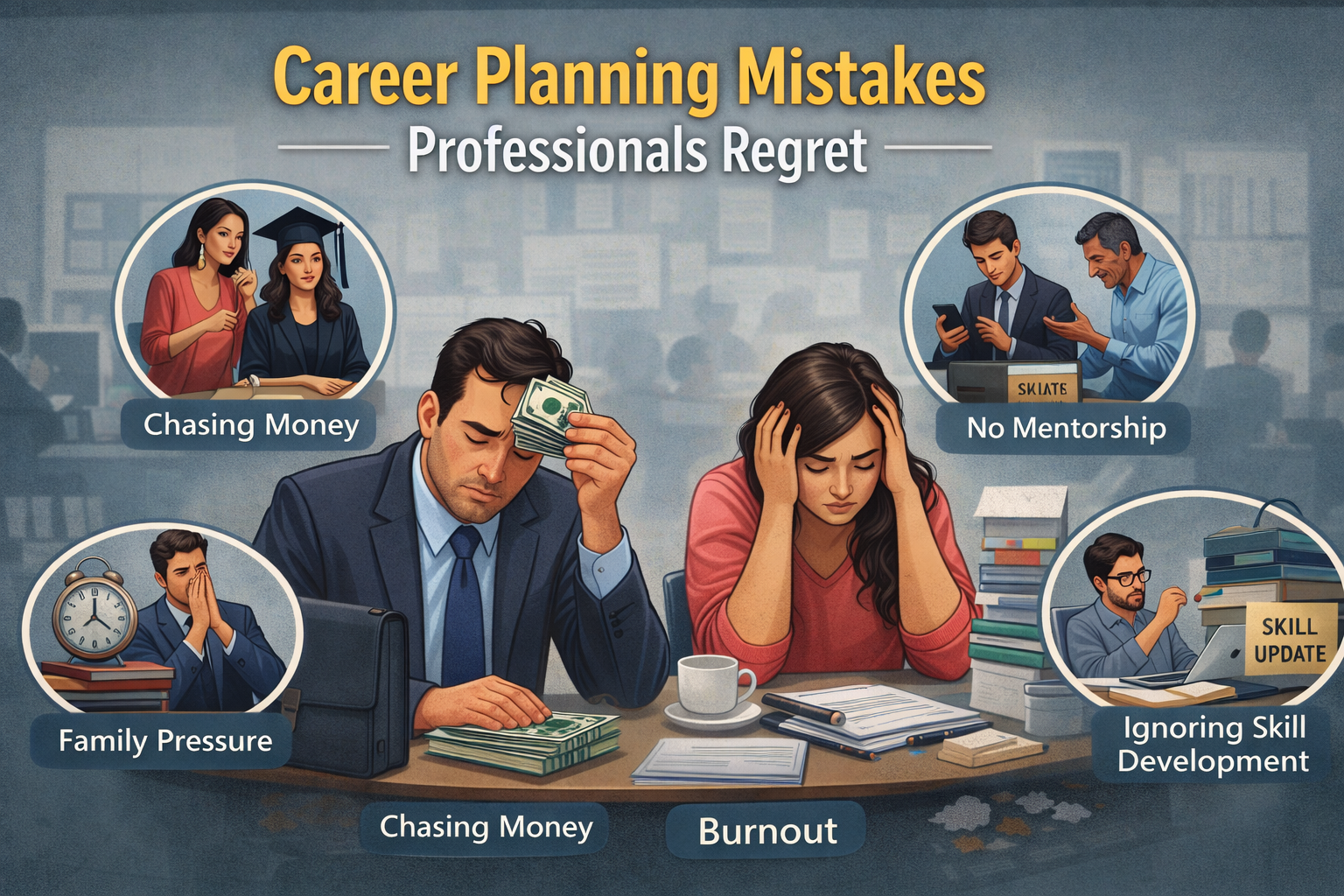Introduction
To achieve anything, mental health is very important.
If you think that only hard work will give you success in your career, then this is wrong. Hard work is important, but mental health is equally essential. You also need to give your brain proper rest to maintain productivity at work.
This article will explain the role of mental health in your career success and provide tips to maintain it. Do read this article if you are struggling with stress or feeling demotivated.
You can read summary of this article here.
What is Mental Health?

Mental health refers to a person’s emotional, psychological, and social well-being. It affects how we think, feel, and behave in daily life. It also influences how we handle stress, relate to others, and make decisions.
In short, mental health is about having a balanced and healthy mind that helps us cope with life’s challenges, work productively, and maintain good relationships.
Connection Between Mental Health and Career Growth
- A positive mindset makes it easy to achieve career goals.
When the mind is healthy and positive then we see every situation as a growth opportunity. This attitude motivates us during the time of challenges.
- Self-confidence and clarity increase.
Healthy mental health improves self-confidence. When we are mentally strong than we can take our career decisions confidently and have the courage to learn from our mistakes.
- Improvement in productivity and efficiency.
Mental fitness increases focus and concentration. Through this we can complete our work on time and with better quality.
- Enhance problem-solving and innovation skills
When the mind is peaceful then we can think more creatively and analytically. This ability is valuable for career growth.
- Make easy to handle work pressure.
A healthy mind stays balanced with stress and pressure also. Through this we do not panic with deadlines and workload and handle it calmly.
- Decision-making is quick and accurate.
With the help of mental clarity, we avoid taking impulsive decisions. We analyze every situation logically which is important for leadership roles.
- Motivation and goal consistency
We stay connected with long-term goals with the help of mental wellness. We do not discourage by short-term failures.
- Improves team coordination and communication skills
When the mind is balanced then we can express our feelings and thoughts clearly. Through this People can build trust in teamwork which is helpful for career growth.
Importance of Emotional Intelligence
Self-awareness empathy and emotional control are very important in teamwork and leadership. When we are self-aware then we know about our strengths and weaknesses. Through this we can easily control our behavior and reactions. Empathy helps us to understand the emotions of other people through which we can build healthy relationships with our colleagues. Through Emotional control we react calmly in stressful situations as well. These qualities are very important for a strong leader.
Successful professionals make emotional intelligence their strength.
Like Satya Nadella the CEO of Microsoft focuses on empathy and understanding in their leadership style. He shows that teamwork and innovation improve with emotional intelligence. Similarly, Oprah Winfrey is also famous for their emotional awareness and empathy. He achieved success through positivity and compassion.
These examples teach that only technical skills are not enough we need to understand emotions to achieve success. Emotional intelligence makes us better leaders, teammate, and ultimately successful professionals.
Work-Life Balance and Its Role in Mental Wellness
In the past, work-life balance was often seen as a clear separation between professional and personal life. People typically worked fixed hours, usually nine-to-five, and once they left the office, work was left behind. There was less technological intrusion, so evenings and weekends were dedicated to family, hobbies, and rest. Today, the concept has evolved significantly.
With remote work, smartphones, and constant internet connectivity, work can follow people anywhere, blurring the boundaries between job and personal time. Modern work-life balance is no longer just about fixed hours—it’s about creating harmony between professional responsibilities and personal well-being, ensuring that neither overwhelms the other.
A healthy balance leads to better mental health, higher productivity, stronger relationships, and greater job satisfaction. Both employees and employers share responsibility in fostering an environment where this balance can thrive. By prioritizing time management, setting boundaries, and embracing supportive workplace policies, we can build a sustainable and fulfilling professional life that complements our personal happiness and long-term success.
Some effective strategies to healthy balance,
- Set clear boundaries between work an life.
- Learn time management.
- Do not avoid breaks.
- Do not ignore rest and sleep.
- Enjoy personal time.
Employ’s Role in Supporting Mental Health
Creating a supportive workplace culture is the responsibility of every employer. When a company gives priority to their employees’ mental health then a positive and trusting environment is created. Employees can easily share their ideas openly in that culture.
Mental health policies and support programs are very important. Companies should create clear mental health policies like regular counseling sessions, employee assistant programs, and wellness activities. Flexible work options like remote work, hybrid set up, and mental health leave help employees manage work pressure.
Companies get long-term benefits through mentally healthy employees. Those employees are more productive with creative and innovative. Stress-free environment helps to reduce absenteeism and increases employee retention rate.
A happy and mentally balanced team make positive impact on the overall growth and reputation of companies.
How Mental Health Influences Career Decisions?
Mental clarity helps to set career goals.
When we are mentally fit and focused then we can easily understand our strengths and weaknesses. Through this we can plan realistic and achievable goals for our career without unnecessary stress or confusion.
It boosts mental wellness, confidence, and risk taking.
We feel confident in our decisions through a healthy mind and show courage to explore new opportunities. At the time of stress or anxiety, we make decisions in hesitation or fear which limit growth. Mentally strong professionals sees challenges as an opportunity.
In short mental health works like a foundation in career planning and decision making. When the mind is balanced and focused than we get clarity, confidence, and progress in our professional life.
Tips to Maintain Mental Health for Career Success
1. Time Management Strategies for Better Mental Health
Time management is very important in remote work because there are a lot of distractions and the deadlines are very tight. The Pomodoro technique is a popular method in which you work for 25 minutes and then take a break for 5 minutes. You can maintain focus on your work by repeating this cycle and you can be safe from burnout.
Time blocking is another effective strategy in which you reserve specific time slots in your calendar for different tasks. For example, creative work in the morning, a meeting in the afternoon, and handling emails in the evening. By applying these techniques, you can maintain a better flow in your work and priorities become clear. These techniques boost productivity and break work into manageable chunks.
2. Setting Boundaries for Better Mental Health
Remote work is a challenge to maintaining work-life boundaries. When you work from home, the gap between personal life and professional life can blur. To avoid all these problems you should set boundaries like deciding a fixed end time and not checking emails and messages after work time. You should clearly communicate your working hours with your team and manager so that they know when you are available and when you are not.
Give time to your mind to relax from this habit, which is essential for your mental health and long-term productivity. You can reduce burnout and enjoy quality time in your personal life by maintaining clear boundaries between professional and personal life.
3. Flexible Work Options for Better Mental Health
If employers provide flexible working hours to their employees, then maintaining work-life balance becomes easy. Every employee has a different productive time; some are more active in the morning and some at night. Employers can take advantage of employees’ productive work by providing them with a flexible schedule. From this approach, employees can manage their personal commitment easily, which also reduces stress and increases overall job satisfaction.
4. Self-Care Practices for Better Mental Health
Many employees don’t use their vacation days because they feel work will pile up or their boss might think negatively of them. Employers have a role in changing this mindset. They should encourage staff to take their vacation days and enjoy their downtime. This helps reduce burnout, refresh creativity, and ensures employees return to work more motivated.
In today’s competitive work environment ignoring mental health is a big mistake. Employer can reduce their staff stress by launching employer wellness programs where employers can give stress management workshops, counselling sessions, and fitness benefits. Mental health days, yoga sessions, and meditation classes are also very helpful. From this employees will be loyal and productive towards the company.
5. Reward Yourself for Achievements
You should appreciate your effort whether it is small or big.
- Become a reward system for yourself.
- You can prepare a coffee treat for yourself after completing a big task.
- You can also enjoy your favourite snack or watch an episode of your favourite show to appreciate yourself.
- Not only for big efforts, you should also appreciate yourself for small achievements. You can pat your back after a small achievement to feel good.
Benefits: These self-rewards encourage you psychologically and motivation gets long-term sustainability from self-appreciation, and you don’t feel your work is boring or forced.
Conclusion
This article explored the crucial role of mental health in achieving career success. It covered how mental wellness influences focus, decision-making, creativity, emotional intelligence, work-life balance, and career decisions. It also discussed the importance of supportive workplace culture, self-care practices, stress management, and building a professional support network.
By understanding and prioritizing mental health, readers can improve productivity, enhance teamwork, make confident career choices, prevent burnout, and achieve long-term professional growth. Practicing these strategies helps maintain both personal well-being and career success, creating a balanced and fulfilling professional life.
Explore new opportunities through Best Job Tool.







Leave a Reply